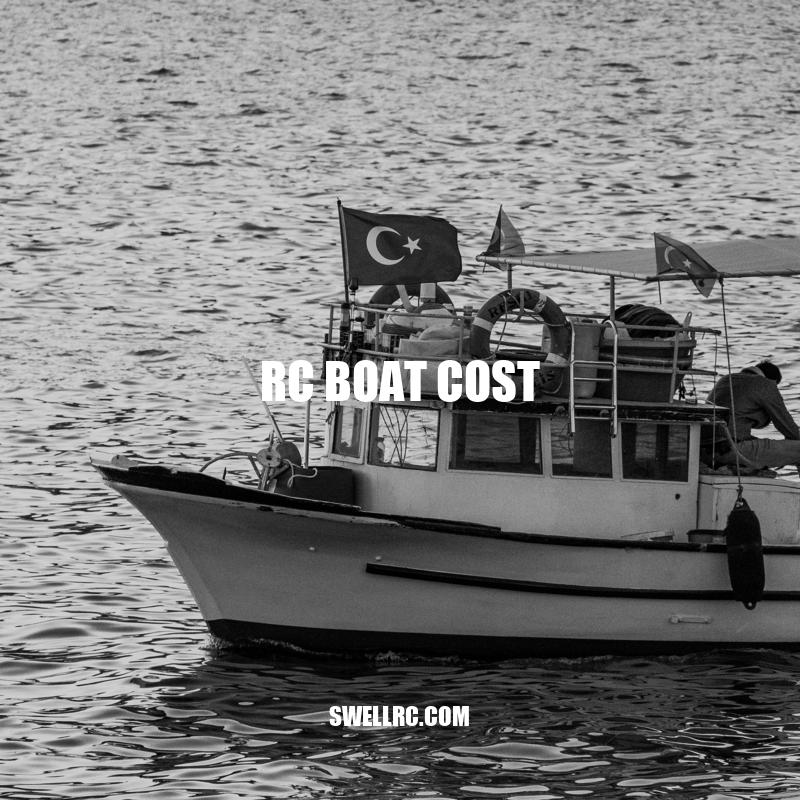Understanding RC Boat Costs: Factors to Consider
RC boats are miniature versions of real-life boats that come with remote controls for easy navigation. They are a great source of enjoyment for hobbyists who enjoy water-based activities, from racing to showing off their skills. However, before diving into the world of RC boats, it is crucial to understand the costs associated with owning one. The cost of owning an RC boat varies depending on several factors, including its size, type, and materials used in construction. The cost can range anywhere from a few hundred dollars to several thousand dollars, depending on the boat’s specifications. It is important to consider all the costs associated with owning an RC boat before making the investment to ensure that it fits within your budget. Understanding the costs associated with owning an RC boat is essential for making informed decisions on the type of boat that best suits your interests, experience level, and budget.
When it comes to RC boats, there are three main types to choose from: electric, nitro, and gas. Each type has its own advantages and disadvantages when it comes to speed, maintenance, and cost. Electric boats are less expensive than nitro or gas models and are easy to operate, while nitro boats offer higher speeds and longer run times. Gas boats are the most expensive option and require more maintenance, but they offer the best performance and speed for experienced hobbyists. Consider your skill level and preferences when selecting the type of RC boat to purchase. Websites like Amazon, HobbyKing, and Horizon Hobby offer a range of RC boats to choose from at varying prices to fit every budget.
What is the difference between electric and nitro RC boats?
| Electric RC boats | Nitro RC boats |
|---|---|
| Require batteries to power the motor | Require nitro fuel to power the engine |
| Quieter and cleaner operation | Can be louder and produce fumes |
| Easy to operate and maintain | Require more upkeep and tuning |
| Less expensive in the long run | May have higher upfront cost and ongoing fuel expenses |
- If you are looking for an affordable electric RC boat, the Udi001 Venom from Amazon may be a good option.
- For those who prefer nitro RC boats, the Traxxas Nitro Rustler from the Traxxas website is a popular choice.
Material Costs
When it comes to RC boats, the materials used to build them can have a significant impact on overall cost and quality. Some commonly used materials include plastic, wood, fiberglass, and carbon fiber. Here are some factors to consider when choosing a material:
Plastic
- Least expensive material
- Lightweight
- Can be prone to damage
Wood
- More expensive than plastic
- Durable
- Requires maintenance
- Not recommended for use in saltwater
Fiberglass
| Pros | Cons |
|---|---|
| Very durable | More expensive than plastic |
| Lightweight | Requires some maintenance |
| Can be repaired easily if damaged | May crack if exposed to extreme cold |
Carbon Fiber
- Most expensive material
- Most durable
- Lightweight
- Used in high-performance racing boats
While plastic is the least expensive material, it may not be the most durable and could require more money for repairs in the long run. Higher-end materials like carbon fiber, on the other hand, may be expensive but offer the best performance and durability. Fiberglass is a popular medium ground for many hobbyists due to its balance of durability and affordability. Before making a purchase, consider the material of the boat and how it matches with your intended use and budget. Websites like RC Planet and Tower Hobbies offer a wide range of materials and parts for RC boats.
Is there a better material than carbon fiber?
Carbon fiber has been widely recognized as one of the strongest and lightest materials in the world. However, there are alternatives that are being developed and researched that may offer even better properties. Some of these materials include:
- Graphene: a 2D material that is even stronger than carbon fiber and has excellent conductivity
- Metamaterials: materials that are engineered to exhibit unique properties such as negative refractive index and cloaking
- Nanocellulose: a renewable material that is lightweight and strong
While these materials are still undergoing research and development, they show great potential for various applications such as aerospace, automotive, and sports equipment. As technology advances, we may see these materials being used more frequently in the future.
If you want to stay updated on the latest materials and technologies, websites such as Material Science News and Science Daily provide insightful and informative articles and news on this topic.
Additional Costs
In addition to the cost of the RC boat itself and the materials used to build it, there are other expenses to consider when getting into this hobby. Here are some additional costs to keep in mind:
- Batteries: Most RC boats require batteries to operate, and the cost of these batteries can add up over time. It’s important to invest in high-quality batteries as cheaper ones may not last as long or provide sufficient power.
- Chargers: Along with batteries, you will also need a charger. The cost of a charger can vary, but it’s essential to choose one that matches the type of battery that your boat uses.
- Speed controllers: Most RC boats come with a basic speed controller, but upgrading to a higher-end controller can provide smoother operation and better performance.
- Accessories: Additional accessories such as carrying cases, tools, and replacement parts may be necessary as you get more involved in the hobby.
It’s important to keep these additional costs in mind when budgeting for your RC boat hobby. Look for websites like Amazon and HobbyKing that offer a wide range of options for batteries, chargers, speed controllers, and other accessories to make your search a bit easier. By knowing the associated costs, you can make an informed decision to ensure that you get the best value for your investment.
What do you need for a RC boat?
To get started with RC boating, you will need the following:
| Equipment | Description |
| RC boat | An appropriate RC boat that suits your preferences and skills. |
| Remote | The transmitter that controls the boat. |
| Batteries | The power source for both the boat and the remote control. |
| Battery charger | Used to recharge your batteries for multiple uses. |
| AA batteries | Needed for some transmitters. |
Once you have all the necessary equipment, you can start enjoying the hobby of RC boating. If you’re unsure about what kind of boat to start with, do some research on websites such as Hobbyking or Horizon Hobby, which offer a variety of boats suitable for beginners and advanced users.
Conclusion
RC boats can provide hours of entertainment and fun, but it’s important to consider the costs associated with this hobby before jumping in. As we have discussed, various factors may affect the final cost of an RC boat, including the type of boat, materials used, and additional accessories required. Taking the time to research your options and evaluate your budget can help you make an informed decision that will result in the best value for your investment.
Fortunately, there are many online resources and hobby shops available to help you find the perfect RC boat. Consider joining online communities and forums to connect with other enthusiasts and gain knowledge on the best RC boats out there. With patience and the right approach, owning an RC boat can be a fulfilling and enjoyable hobby that brings you so much joy without breaking the bank. So, arm yourself with knowledge, and happy sailing!



